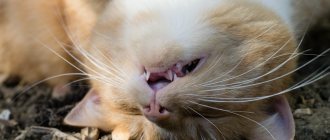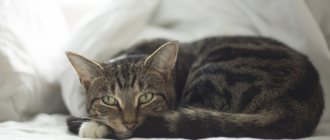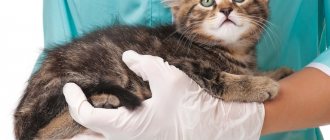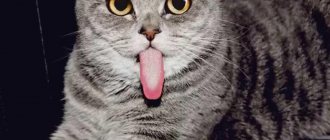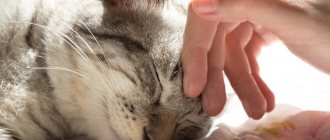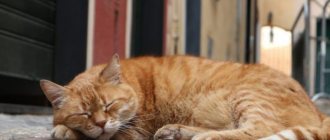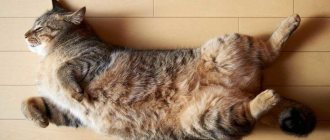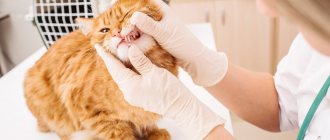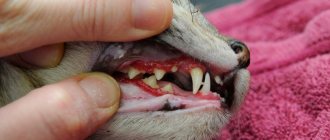A caring owner is concerned about why the cat has become lethargic and sleeps all the time. This condition occurs in kittens and adult cats. There can be many reasons. To find out what it is connected with, you need to contact a veterinarian and conduct a series of diagnostic tests. If you do nothing, serious complications are possible, including death.
Why is the cat acting lethargic?
This state means complete indifference to the environment, weakness, drowsiness, the animal lies all the time, does not react to the outside world, perhaps even refuses to eat. Lethargy in cats occurs for the following reasons:
- middle age;
- taking medications;
- decrease in hemoglobin in the blood;
- heart and vascular diseases;
- inflammatory processes, infections;
- injuries;
- tumors;
- neurological diseases;
- disruption of hormone levels and endocrine system;
- helminths;
- piroplasmosis;
- being in a stuffy room.
Diseases accompanied by lethargy
Anemia and apathy
A pet's lethargic state can be caused by a low level of hemoglobin, which is caused by poor nutrition.
The cat has become less active, has stopped enjoying life normally, is not eating well, the mucous membranes have become pale - one of the reasons may be anemia. This means that there is a decrease in the number of red blood cells and hemoglobin in the pet’s blood. Factors that contribute to anemia can be both poor diet and various diseases.
Stomach diseases
If the cat does not eat well and sleeps constantly, he experiences periodic vomiting, diarrhea, he has become passive, it is necessary to check the organs of the gastrointestinal tract. The cat becomes weak. Perhaps she will eat inedible objects. When nauseated, swallows fur or balls of hair to induce vomiting.
Diseases of the cardiovascular system
The reasons are completely different. Most often develop after an infectious disease. The cat becomes apathetic, lethargic, eats poorly, plays little, blood pressure is low, and breathing is rapid. The mucous membranes become bluish in color. Swelling appears. There may be an increase in body temperature, the cat is hot to the touch and sad. In severe cases, the weight sharply decreases or increases. The animal trembles, drinks a lot, breathes heavily with its mouth open, hides from people, and does not get up.
Infections and inflammation
Infectious inflammations are accompanied by symptoms such as coughing or vomiting.
Diseases of an infectious and inflammatory nature are manifested by changes in the cat’s behavior. He eats nothing all day, lies inactive, and hardly plays. This passive state is accompanied by other signs. In case of kidney ailments - swelling of the cat's face, paws, rapid breathing, she often goes to the toilet, vomiting and weight loss are possible. Rhinotracheitis occurs similarly to a respiratory infection in humans. Accompanied by nasal congestion, cough, watery eyes, the cat is hot, the mucous membranes of the nose and throat are swollen. The nose is dry and cold.
Piroplasmosis
The carrier is ticks infected with Babesia. Most often they bite unvaccinated cats during the peak of activity, that is, in spring and autumn. Pets develop weakness and become apathetic. The cat eats little and sleeps a lot. A complete refusal of food is possible. A high temperature and pallor of the mucous membranes appear. The urine becomes dark or red. If treatment is not started at an early stage, the animal will die.
Tumor processes
In cats, like in people, education does not make itself felt for a long time. You need to pay attention to your pet’s health in order to recognize it in time. The cat has become lethargic, sad, apathetic, lies constantly, and rarely plays. Usually body weight falls, diarrhea and vomiting occur. With a brain tumor, neurological disorders appear (lethargy, hallucinations, seizures). Sometimes lethargy sets in.
If your cat's nose is dry but cold
Of course, a symptom of the disease, the so-called evaporation of mucous membrane from the cat’s nose . There are also additional symptoms. For example:
- Warm ears;
- Decreased activity;
- Heat;
- Loss of consciousness;
- Constipation;
- Vomit;
- Hair loss;
- Labored breathing;
- Skin rash.
If these symptoms occur, you urgently need to consult a veterinarian . But in this case, the term high temperature means checking the temperature not with the cat’s nose, but with a thermometer. This is done with a regular thermometer; to do this, you need to hold the animal tightly and press the thermometer against it.
IMPORTANT! The normal temperature of a cat is 38-39 degrees, for cats with short hair it is 40 degrees. For small kittens it is 39.5, 40 degrees.
If the pet’s temperature rises by 1 degree, then there is nothing wrong with it , but a higher temperature means that the pet is sick. There are a couple more signs that a pet is ill, for example, it does not respond to the owner’s call and hides in a dark corner. We can assume that a pet is sick only if it has several symptoms at once .
Other reasons
Helminthiasis
If parasites enter a cat's body, it may experience health problems such as diarrhea or hair loss.
The disease is caused by parasites - worms. They can be present in grass, food, soil, water. Once in the animal's body, they use it for survival. The cat has health problems. Symptoms depend on the degree of worm infestation. The cat does not eat, vomiting, diarrhea, cough, hair loss, rashes appear, the pet scratches its butt near the anus. The tummy gets bigger. Symptoms of intoxication appear.
Age of the cat
An old cat becomes lethargic, sleeps a lot, plays little, appetite, hearing, vision and smell are impaired. The fur becomes dull. As an animal ages, its behavior changes. Or the pet becomes more affectionate, climbs into your arms, caresses. Or, on the contrary, he shows nervousness and aggression. The immunity of cats decreases, which is why they are susceptible to infections.
Vaccinations for babies
Vaccination protects animals well from various diseases. However, complications may occur. Both allergies and individual reactions. After vaccination, the kitten eats poorly, is lethargic, drowsy, refuses to eat, and the temperature rises. The nose becomes hot or cold. If these symptoms last more than 3 days or are too severe. you need to contact your veterinarian.
Features of feeding
At the end of the rehabilitation period, the animal becomes completely healthy, which means that its diet should be the same as before the operation. Very often, a sterilized cat begins to eat more than usual, as a result of which she quickly gains weight. The owner should pay attention to this and limit the intake of smoked, fatty, salty foods, as well as pasta, beans, fish and bread.
Obesity of a cat after sterilization
To prevent constipation, dry food offered to your pet should be pre-soaked. To prevent your cat from gaining excess weight, you need to play with it more than before.
Diagnostics
At the appointment, the veterinarian collects an anamnesis from the owner, what the animal did and ate, and then carries out diagnostic procedures.
There are methods that will allow you to make a correct diagnosis and find out why your beloved animals are sick:
- It is necessary to find out what the owner associates the disease with. What did the cat eat, where was it, did it walk outside, what medications did it take. That is, collect anamnesis.
- The doctor takes tests - general blood and urine, biochemistry, feces for coprogram and worm eggs.
- Depending on the symptoms, additional examinations are prescribed - ultrasound, x-rays, surgical diagnostic intervention.
Cat sleep: how long does it last?
The duration of sleep depends on many factors. This includes age, room temperature, sense of security, activity, and weight of the pet. Cats sleep for long periods of time, spending more than half their lives simply snoring, but unlike humans, cat sleep is rarely deep.
How does a cat sleep? For many, this still remains a mystery, but research allows us to lift the veil of secrecy. An animal's sleep can be divided into several cycles and phases:
- Preparation - choose a warm place, preferably elevated above the floor, soft and comfortable. The cat stomps to check whether it is safe to lie here, and also to create a depression. He stretches, relaxes and lays down;
- Napping - the cat sleeps calmly, does not make sounds, most often lies in a ball or on its stomach. Breathing slows down at this time, the heart beats slower, but the pet is very sensitive. If you touch him, he will wake up immediately. This phase lasts no more than half an hour;
- Deep sleep - occurs after a nap if the cat is not bothered by anything. Muscle tone is completely absent, the eyelids begin to twitch, convulsions, cramps, twitching of the paws and whiskers may appear. Your pet dreams: hunting, attacks, treats, which leads to growling, turning from side to side, meowing. NREM sleep lasts about 20 minutes, and then it is replaced by drowsiness again;
- Waking – Depending on why the cat woke up, its awakening will vary. So, if the pet is awakened by appetizing smells or a slight feeling of hunger, the cat will be lethargic, stretch, and close its eyes. If the reason lies in sharp sounds and a sense of danger, the animal will quickly emerge even from the stage of deep sleep.
Seals rest a lot, their sleep is over 16 hours a day. Babies and older pets sleep the longest: young and active animals have much more worries and hobbies. During sleep, babies have to gain strength and grow better, so kittens rapidly gain weight and grow up very quickly.
However, even at home, the cat does not cease to be a predator and hunter. He sleeps extremely carefully, constantly wakes up, and as soon as you open the refrigerator or unwrap the rustling wrapper, his little ears will rise, and the pet will restlessly inspect the territory.
The reason for cat sleep is not that your pet is lazy and loves to sleep. It's all about his natural instincts. Under natural conditions, a cat is an animal devoid of herd instinct. He hunts, eats and sleeps, gaining strength. In an apartment, everything is even simpler: there are simply no activities, and there are no worries. But what's a pussy to do? The plush ball spends its free time sleeping, then eating, playing a little and falling back into sleep.
Scientists have been conducting research for a long time, observing pets, even connecting them to special equipment to monitor their condition and better monitor changes in the body. So, there are several reasons for sleep:
- Natural instincts;
- Lack of activities and entertainment;
- Boredom - the ball simply has no one to play with, or it is tired of its usual activities;
- Disease – animals get sick no less often than people.
After castration, the cat will rest longer. Why is this happening? His natural instinct to procreate is suppressed, a lot of sleep is compensation for the animal. What else to do in a small apartment: just eat and relax. The duration of sleep increases not only after castration, but also as the pet ages - it needs more time to rest.
By the way, when the ball is not allowed to sleep for a long time during experiments, or the environment is unsafe for rest, the pussy becomes restless, aggressive and extremely irritable. When everything is in order, these animals do not suffer from insomnia, they have turned sleep into a real art, they know how to do it with pleasure, they fall asleep quickly, and wake up extremely easily.
How to treat a pet?
To cure a disease, the cause must be eliminated.
If it is caused by taking medications, stop taking it. For helminthiases, the cat is given a drug that removes them. They go to the toilet and the worms will come out along with the feces. Piroplasmosis is treated with special substances that kill Babesia. In case of inflammation and infections, you need to relieve this process with anti-inflammatory or antibiotics. Maintenance therapy and pills to boost immunity are used. Only a doctor can identify the cause and prescribe the correct treatment.

